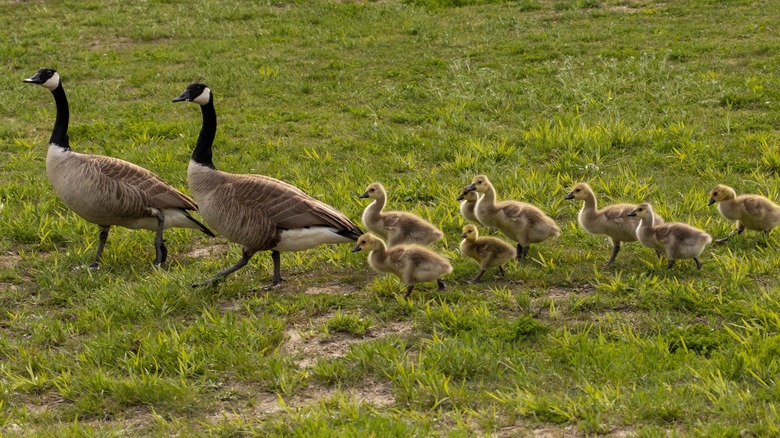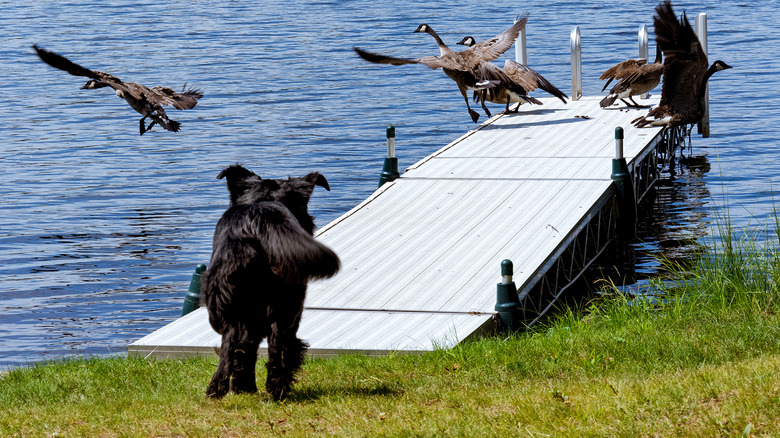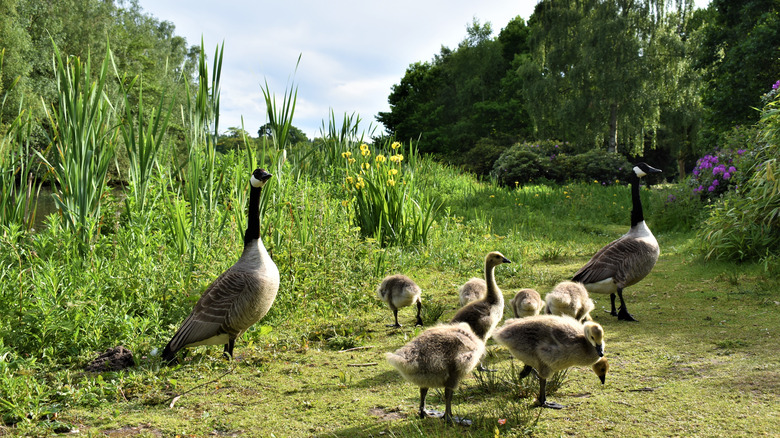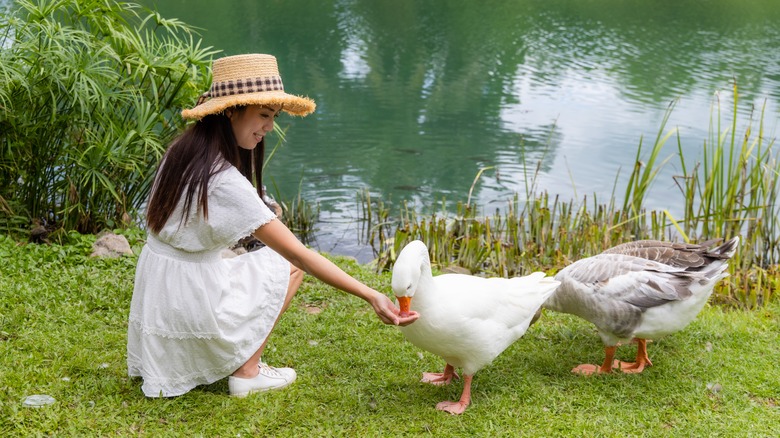Simple Ways To Keep Geese Out Of Your Yard For Good
Geese draw a lot of attention when flying overhead in their traditional "V" pattern during migration. It's an impressive sight. However, they draw attention for a different reason when they decide to make your yard or property their home. Geese are large birds that can do a lot of damage to your lawn. They eat grass, flowers, and green leaves, potentially damaging your plants and bushes while creating bare, muddy spots. All of this can make quite a mess of your yard, forcing you to do a lot of maintenance and repair work.
Fortunately, you can take multiple, simple steps to convince geese to move out of your yard and into a different location without harming them. There are fruits you can use to keep geese out of your yard, but if you're looking for sturdier or leave-it-and-forget-it types of solutions, we have multiple ideas you can try.
Even if you are not worried about these birds eating the plants in your yard, there are other reasons geese are among the most common birds that you do not want to see in your yard. They leave large, soft droppings and feathers behind, creating quite a mess. They can even attack pets and children who might approach them, especially if there's a nest in the area. They generate a lot of noise that may be difficult to tolerate in a quiet neighborhood. The best solution is to encourage these birds to find another location to live.
Options for scaring geese away from your yard
If you have a dog, try walking the dog several times a day in the area where the geese appear. The birds do not like to see dogs because they represent a natural predator, so a regular appearance by a dog will eventually convince the birds to go somewhere else. Just be sure to use this option when you initially notice the geese in the area. If you wait until they nest, they will become aggressive against the dog and you.
Another option to scare the geese is to deploy noisemakers in the area where they are appearing. You can use a recording device to play noises from predators, such as barking dogs. Noisemakers triggered by the wind can also drive these nuisance birds away. Carry a can or bottle filled with coins and walk near the animals several times per day while shaking it, disturbing them and convincing them to move on. Before deploying noisemakers, make sure any nearby neighbors are on board with you using this technique.
Some natural decoys exist that can help with chasing geese away from the area. Having a statue of a coyote or another predator can scare the birds. If you are near a pond in the Southeast, placing a fake alligator head in the area may do the trick. Eventually, though, geese will ignore these decoys, so if they don't work initially, you may need another option.
Change your landscaping to try to combat geese appearing in your yard
If you don't mind making some long-term changes to your property, there are landscaping changes that work to keep geese from invading your yard. These birds need a body of water nearby. If you believe the geese are walking into your yard from a nearby pond, you can erect a fence, a tall hedge, or bushes to make it difficult for the geese to walk into your yard. They will likely then choose to walk in another, easier direction away from the pond. Some people even attach mylar tape, banners, or balloons to the barrier, further scaring the birds away.
Another option is to simply remove grass and other plants that the birds like to eat from the area of your property where they are being a nuisance. Perhaps you are tired of mowing and fertilizing your grass, meaning you're ready for a change. You can create a garden space that focuses on native plants and rocks or mulch, leaving very few items for geese to eat in the area.
Geese tend not to like having tall grass in areas where they want to walk. They often refuse to nest in areas where they don't have a clear line of sight because of concerns over lurking predators. Plant tall, ornamental grasses in lines around your property, especially near the edges, and the geese will be less likely to attempt to set up a home in your yard.
Making your yard and property less hospitable to the geese
You may have started feeding the geese when they first appeared on your property, appreciating the beauty of the wildlife. However, once you realized the kind of damage they were doing to your yard, you regretted giving them food and attracting them. Never feed geese when they come into your yard. If you have been feeding them for a while, you should stop immediately.
If you start feeding them, the geese may feel comfortable enough to start building nests close to your house, as long as the area is mowed and is free of tall grass. If you believe they are trying to nest, place a short fence around the area, as they prefer to walk to and from their nests. The fence should deter them. Pay particular attention to the birds at the times they like to build nests, which is usually late winter and into spring. Signs that they may be preparing to nest include seeing squabbles between the birds. When you approach, they may start hissing at you rather than running away when they are preparing to nest. If you see these behaviors, it's time to take steps to deter them from nesting in your yard.
Finally, you can try goose repellents, which are sprays that you apply to your grass and bushes that make the plants taste bad to the geese without harming them. Such repellents are safe to spray on the yard and around pets.



